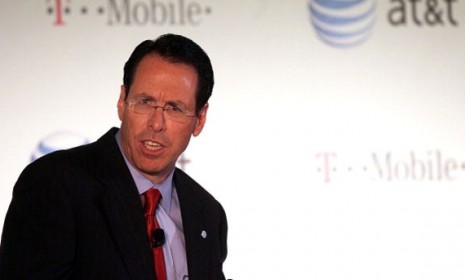AT&T buys T-Mobile: Winners and losers
In a surprise move, America's biggest cellphone network will swallow a smaller rival for $39 billion. Who stands to gain from this mega-deal?

A free daily email with the biggest news stories of the day – and the best features from TheWeek.com
You are now subscribed
Your newsletter sign-up was successful
Telecom giant AT&T announced plans over the weekend to buy T-Mobile, its smaller rival, for $39 billion in cash and stock. The surprise deal is expected to close next year, if government regulators approve it, and will effectively reduce the number of national cellphone carriers from four to three — AT&T, Verizon and Sprint. Who stands to win from this enormous merger, and who will lose out?
WINNERS
AT&T
The Week
Escape your echo chamber. Get the facts behind the news, plus analysis from multiple perspectives.

Sign up for The Week's Free Newsletters
From our morning news briefing to a weekly Good News Newsletter, get the best of The Week delivered directly to your inbox.
From our morning news briefing to a weekly Good News Newsletter, get the best of The Week delivered directly to your inbox.
"Probably the most surprising winner... is AT&T," says Scott Moritz at The Street. You might expect such a costly acquisition to scare off those investors who view it as "dilutive and risky," but the market is "cheering the moxie of a big wireless land grab." AT&T shares were already up 3 percent in early trading on Monday.
Deutsche Telekom
The positives for T-Mobile's German parent company, says Archibald Preuschat at The Wall Street Journal, include a board seat at AT&T and 8 percent of the company. Even better, the $25 billion in cash it's pocketing will pay off a significant amount of its debt. Even if regulators shut the deal down, it will still get a "$3 billion break fee." The European giant is "the darling of investors right now."
Investors
A free daily email with the biggest news stories of the day – and the best features from TheWeek.com
The Dow Jones Industrial Average surged this morning on news of AT&T's acquisition, says CNBC.com. It gained more than 190 points in morning trading — welcome news after a week in which the Japanese crisis and lower-than-expected existing home sales pummeled the Dow. "All key S&P 500 sectors gained, led by energy, technology and industrials."
The FCC
The Federal Communications Commission has gained leverage, says former FCC chief counsel Bruce Gottlieb at The Atlantic. Though congressional Democrats and consumer groups are already crying foul about the merger, "any company with a major transaction before the government suddenly gets a lot more cooperative on every other issue." So, if the FCC plays its cards right, it could force AT&T to expand its 4G coverage nationwide.
LOSERS
Sprint
"Sprint is clearly seen as the big loser here," says Eric Savitz at Forbes. Sprint had attempted to buy T-Mobile itself, but was rebuffed. Now, its stock has slumped 15 percent in morning trading, and it faces the prospect of being a distant third in the cellphone market for the foreseeable future, a "nightmare scenario."
T-Mobile customers
T-Mobile has long been a "distinct alternative" to AT&T, says Kent German at CNET. It "excelled at customer service, it delivered on value, and it never failed to keep its phones interesting," even if it did not offer the Apple iPhone. Will AT&T match T-Mobile's customer service and retain its "aggressive prepaid plan pricing"? Given AT&T's record, "I'm not hopeful." And T-Mobile customers hoping to finally get their hands on an iPhone will reportedly have to wait at least a year.
All consumers
"Don't think this deal won't affect you if you aren't a T-Mobile customer," says Brett Arends at MarketWatch. The loss of a fourth player in the cellphone market means less choice, which means less power for the consumer. AT&T's Soviet-style dominance was large enough already. "After this deal, the three players left will be able to sit back, take it easy, and carve up the hapless consumer."
T-Mobile employees
The merger will give AT&T roughly 130 million total customers, says Julie Gerstein at New York. "But it'll likely come at the expense of thousands of jobs." The telecom behemoth employs 267,000 people, while T-Mobile employs just 38,000. How many of those jobs will disappear as the merger goes through?
Nokia, Sony Ericsson, and other device manufacturers... except Apple
"Fewer national carriers means fewer large companies to distribute [manufacturers'] wares," says Avram Piltch at Laptop Magazine. Together, AT&T and T-Mobile offer nearly 50 smartphones. "Expect that number to be cut in half," bad news for companies like Nokia and Sony Ericsson who are trying to grow market share. It's better news, though, for Apple, which will see less competition from T-Mobile's range of smartphones and tablets.
-
 Political cartoons for February 16
Political cartoons for February 16Cartoons Monday’s political cartoons include President's Day, a valentine from the Epstein files, and more
-
 Regent Hong Kong: a tranquil haven with a prime waterfront spot
Regent Hong Kong: a tranquil haven with a prime waterfront spotThe Week Recommends The trendy hotel recently underwent an extensive two-year revamp
-
 The problem with diagnosing profound autism
The problem with diagnosing profound autismThe Explainer Experts are reconsidering the idea of autism as a spectrum, which could impact diagnoses and policy making for the condition